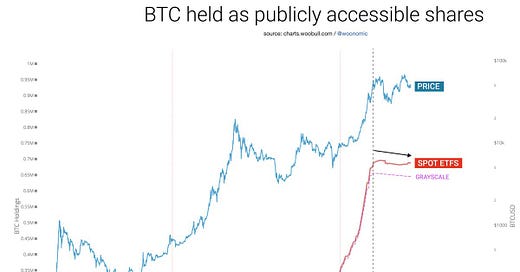Riding The Wave News Summary #6
Welcome to Riding The Wave. If you have questions or feedback, please reply to this email. If you are new to the Newsletter, please check out what we provide on our about page and consider subscribing. Within the Newsletter, I provide News Summaries, Weekly Status Updates, & Deep Dive Articles on Specific Topics (Ex: How do I pick which coins/tokens to buy?). More details here
For any free tier users interested in the paid tier, I will be offering membership for $10 monthly or $100 annually until January 10th, 2022. It is temporarily available at this lower price to reward early subscribers who join prior to an established substack track record & an archive of available content. After this point, the price will move to $15 monthly & $150 annually.
News
Table of Contents
Sam Bankman-Fried says a tidal wave of institutions could jump into crypto in 2022, if they get clear regulations
The number of countries banning crypto has doubled in three years
Chinese Central Bank’s Digital Yuan App Hits Apple, Android Stores
Bitcoin Hashrate Hits New All-Time High
Bitcoin holdings of public companies surged in 2021
Cardano Sets Itself Apart From Ethereum With Its Academic Approach
Cardano became the most developed crypto project on GitHub in 2021 — Santiment
South Korean Presidential Hopeful Plans to Finance Election Campaign With NFTs
K-Pop Band BTS Moves Forward With NFTs in Face of Fan Protest
Unlocking utility is key for fashion brands launching NFTs in 2022
Sam Bankman-Fried says a tidal wave of institutions could jump into crypto in 2022, if they get clear regulations
The crypto exchange CEO predicted that regulatory clarity will open the door for some large investment banks and pension funds to enter the industry this year.
But he said developments in digital asset regulation will dictate the pace of adoption by financial institutions.
"Especially if we feel like they're getting clarity, that could come in a tidal wave, it could come in a trickle," he said in an interview released Monday.
Still, he doesn't expect a rapid inflow within the next six months at least as it takes time for institutions to onboard new platforms and assets.
"It's going to be a long process probably stretched out over a few years," he said, adding that the size of the market could be "really enormous."
"I've talked to every large bank, every large investment bank, pension funds — they're all eyeing the sector. Many of them have started breaking ground on their activities in it, but it's just slow and it takes time."
A growing number of financial institutions, including BlackRock, Mastercard, and Visa, have already introduced crypto-related offerings. Some financial advisors have recommended digital assets should be part of a portfolio, no matter what your age.
We are still only seeing the beginning of companies jumping into crypto which is extremely exciting as there is a large amount of room left for demand to go up and therefore the price of crypto as a whole to rise. Once the US government draws up what is and isn’t allowed legally for crypto trading adoption will speed up but until then the majority of investors at the institutional level will likely continue to be financial companies.
If the government continues to drag its feet this could delay a lot of institutions from jumping in but with how long they have already delayed I think it’s unlikely that the regulations get pushed back another year.
The number of countries banning crypto has doubled in three years
Although 2021 was a good year for the cryptocurrency industry in terms of market performance, the number of jurisdictions banning crypto has more than doubled since 2018.
A report by the Library of Congress (LOC) details the nine jurisdictions that have now applied an absolute ban on crypto and 42 with an implicit ban. This is up from eight and 15, respectively, in 2018 when the report was first published.
In the context of the LOC report, an absolute ban means any “transactions with or holding cryptocurrency is a criminal act,” whereas an implicit ban prohibits cryptocurrency exchanges, banks and other financial institutions from “dealing in cryptocurrencies or offering services to individuals/businesses dealing in cryptocurrencies.”
The nine new jurisdictions with an absolute ban are Egypt, Iraq, Qatar, Oman, Morocco, Algeria, Tunisia, Bangladesh and China. China’s crypto ban received the most attention in 2021.
While this initially sounds bad, it’s actually good news. If countries were indifferent to Crypto, that would mean there wouldn’t be progress for or against it. We want Countries to continue acknowledging it and to ideally provide regulations enabling growth for the community.
I would also like to note that China’s ban was likely pushed at its core to prep for the digital Yuan launch and remove the competition that Bitcoin represents.
Chinese Central Bank’s Digital Yuan App Hits Apple, Android Stores
China’s digital yuan is inching ever closer to rollout – with a pilot version of a central bank-issued app and wallet released on Apple and Android app stores in the country.
The media outlet noted that users could only make use of the app if they were in the following cities: Shenzhen, Suzhou, Xiong’an, Chengdu, Shanghai, Hainan, Changsha, Xi’an, Qingdao and Dalian. Beijing-based individuals in the parts of the city where the Winter Olympics will be held next month will also be allowed to access the app.
The government is hopeful of executing a full rollout in the capital – or possibly nationwide – in time for the games, which begin on February 4.
The PBoC is keen to ensure that its digital token can be used by those without smartphone access, and has been testing a range of hardware wallets and smart card-like solutions that will allow for offline usage.
Keep reading with a 7-day free trial
Subscribe to Riding The Wave to keep reading this post and get 7 days of free access to the full post archives.



